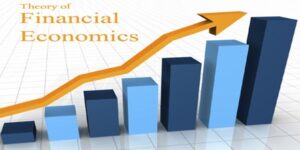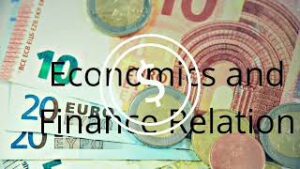The study of economics involves analyzing the dynamics of supply and demand, the division of labor, and decision-making processes. Macroeconomics, on the other hand, studies the behavior of an economy as a whole, including interest rates, total production output, and business cycles. Both fields use aggregate indicators to analyze trends and predict future behavior.

What are economics and finance?
In its most basic terms, economics and finance are two disciplines that study the relationship between the economy and money. They involve the analysis of money, credit, investments, and other financial systems. They can be categorized into three major categories: public finance, corporate finance, and personal finance. If you want to make your mark in the finance industry, you should understand economics well.
Economics deals with the movement of money in the market and the effects of monetary and fiscal policies. Finance examines how these policies affect the value of money and how they can affect industries. Both are important because they impact the market and are often the basis for many investment decisions. In addition, both fields are interrelated, which is why the study of both fields is important for investors. However, it is important not to fall into the trap of making an “either/or” argument; both fields have their own usefulness and applications.
As a branch of economics, finance studies the origin of money, how it flows through different markets, how banks manage funds, and how people use that money. It also focuses on investments and risk management. It can be a great career path because it allows you to advance and gain experience while developing your expertise. In addition, you can get professional qualifications in areas such as financial planning, investment management, and customer relations.
Economics and personal finance
This course explores the economic principles of micro and macroeconomics and the role of money in society. Students also learn about financial literacy and decision-making skills for business and personal management. Topics covered include credit scores, life and health insurance, retirement planning, and consumer rights. Students also complete a culminating project involving retirement planning. The course also helps students prepare for the CTECS Workplace Readiness Skills Assessment and the Financial Literacy Certification Exam.
The fields of economics and personal finance are closely related, though there are differences between them. Economics is a branch of social science that focuses on the overall functioning of an economy while finance focuses on specific factors within it. While both fields have important differences, they do complement each other. In general, economics focuses on how people allocate resources and how they evaluate risk. The field of finance is further broken down into three main branches: personal finance, corporate finance, and public finance.
In a high school course, students study economics and personal finance. This course builds students’ analytical and critical-thinking skills, enabling them to make financial decisions that will impact their lives in the long term. This course explores basic principles of economics and examines markets from both a historical and contemporary perspective. The course also covers theories of value and the role of banks. Keynesian economics is discussed, as are issues such as national debt, inflation, and unemployment.
Why are economics and personal finance important?
Economics and personal finance are critical for students who will be participating in the economy for the rest of their lives. A strong understanding of these subjects is helpful in planning for retirement and other major life events. Students should also develop the skills to manage debt, understand the benefits of borrowing, and make wise financial decisions.
The North Carolina Department of Public Instruction supports the development of financially and economically literate students through courses in personal finance and economics. The Economics and Personal Finance course focus on teaching students about personal finances and income. It also teaches them about critical consumerism and financial planning. Students should be able to analyze the impact of their personal finances on the economy and understand how they affect it.
The study of economics and personal finance is an integral part of the learning process in kindergarten through high school. Students should have a basic understanding of the principles of money management and economics before taking an economics course. Those who study these subjects are more likely to be financially responsible because they can make informed decisions that benefit them and their futures.
The study found that states that require stand-alone economics and personal finance courses in high schools reported improvements in average credit scores and lower rates of payment delinquency. This positive impact grew with each graduating class.
Types of personal finance
Personal finance involves the use and management of financial resources, including savings and investment accounts. It also encompasses the use of consumer credit. These credit accounts are typically obtained from commercial banks or savings and loan associations. Consumers can also obtain financing for consumer durable goods. Credit cards and charge accounts are other forms of short-term credit. In addition, banks also provide small cash loans.
Saving is the portion of income left over after expenses. It can be used for an emergency fund, investments, or future purchases. It is important to have an emergency fund to provide for sudden fluctuations in income. Ideally, you should set aside three months’ worth of savings for emergencies.
In addition, you should invest any surplus income that you have.
Personal finance is an extensive field. It is closely related to other areas of economics, including consumer and family economics. It is also related to financial planning and budgeting. There are several types of personal finance in economics, and each one has its own goals and definitions. You can learn more about personal finance by reading up on the subject.
Investments are perhaps the most complicated area of personal finance. It is important to seek professional advice before making any investments, as different investments carry varying levels of risk and reward. Personal protection is another area of personal finance that most people seek advice in. This involves a variety of products and services that are often complicated and require a lot of analysis and planning.
The relationship between economics and finance
Economics and finance are closely related disciplines that analyze the ways in which economic systems work. Economics deals with the study of demand and supply curves, the cost of goods and services, and other concepts related to money. Finance deals with how to make optimal decisions based on these data. It also applies these principles to real-world industries.
The study of finance involves the study of financial markets and interest rates. Interest rates form the theoretical foundation for all financial valuations, and financial instruments such as stocks and bonds promise variable or fixed future cash flows. Other instruments that can be purchased include TIPS, or Treasury Inflation-Protected Securities, whose repayment varies with changes in the Consumer Price Index.
While both fields use similar principles, economics is the more comprehensive of the two. While finance focuses on accounting and figures, economics focuses on human behavior and adopts scientific methods. Ultimately, the two disciplines complement each other. However, there are many differences between economics and finance.
In the field of economics, there are two branches: microeconomics and macroeconomics. Microeconomics focuses on the behavior of individual economic units, while macroeconomics focuses on the behavior of entire economies.

Economics vs business
Economics is a field that is concerned with solving problems. The field addresses issues such as poverty, unemployment, and life expectancy. In contrast, business tends to focus on profit and facilities for shareholders. Although these topics are often associated, the two fields are different in many ways. While economics has wider concepts, business is more practical.
While economics deals with the broader issues of how people manage their limited resources, business focuses on the activities of the individual and the company itself. Economics helps to frame governmental policies, business is concerned with individual activities and profits. Both fields have their merits. Here are some common ways to distinguish between the two fields.
Students often confuse business and economics. Many students don’t understand the differences between the two fields and feel that they have to major in business to be successful in the business world. Choosing a field based on your interests is an important step in choosing a career path. However, it’s important to understand the differences between economics and business before making your final decision.
The main difference between business and economics is the focus. While a Bachelor’s degree in business and an MBA in economics can cover the same topics, the two do not share the same focus. While business focuses on the production of goods and services, economics focuses on consumption and distribution.
